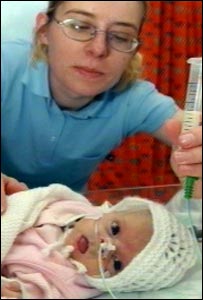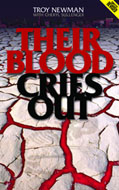|
Child Euthanasia...
Already Happens Everywhere, Says Dutch Hospital PARIS – The disclosure by a Dutch hospital that it has carried out euthanasia on terminally ill newborn babies has shocked pro-life groups, but the institution claims it is merely trying to bring into the open a practice already happening around the world. Groningen Academic Hospital is asking the Dutch government to approve guidelines legalizing euthanasia on newborns described as enduring "unbearable suffering" and with "no hope of a future." The hospital has admitted doing so in the case of three babies last year. In a statement issued Friday, Groningen pediatrics head Dr. A. Verhagen said that "worldwide, the U.S. included, many deaths among newborns are based on end-of-life decisions, after physicians reached the conclusion that there was no quality of life." The hospital said it had the support of the Netherlands' eight teaching hospitals in asking the government to legalize child euthanasia. It said studies had shown that pediatricians were in favor of intentionally ending the life of a newborn who is suffering greatly and terminally ill. The Netherlands three years ago became the first country in the world to legalize euthanasia . Doctors can lawfully end a life only at the patient's own request. A health ministry official said the government was working on guidelines for child euthanasia and expected to present a bill to parliament early next year. "Right now, if a
doctor puts an end to the life of a very ill newborn, even at the request
of the parents, he can be prosecuted," said spokesman Richard Lancee.
'Slippery Slope' Cry for Life, a Dutch pro-life group, is strongly opposed to the move. It says that any attempt to widen the euthanasia law is very dangerous, in that it will give society the right to decide cases in which it can legally kill. "It's another step on the slippery slope of Holland's euthanasia and abortion programs," said the group's chairman, Bert Dorenbos. In what it calls the Groningen Protocol, the hospital said it was asking for five criteria for making a decision on ending a child's life. The child must be suffering severely; there must be no possible cure or relief through medical treatment or surgery; parents must consent; independent doctors must give a second opinion; and the ending of life must be "meticulously carried out." "It is in the interest of newborns who have to endure unbearable suffering that we draw up a nationwide protocol that allows each pediatrician to treat this delicate question with due care, knowing that he followed the criteria," Verhagen said. Dorenbos said there
was little chance of wide public opposition to the proposed guidelines
because the hospital was stressing only the question of alleviating pain
in suffering babies. 'Intention Is to Kill These Babies' "People are confused because the doctors talk about mercy killing, but the truth is that their intention is to kill these babies," Dorenbos said. Dorenbos argued that the Dutch euthanasia laws served primarily to protect doctors from prosecution. "The law does not have any objective measure of what illness is, what a patient is, what the patient's rights are," Dorenbos said. "It only talks about a doctor's rights, and those are focused on how to protect the doctor from prosecution. This law has no borders to measure what is right or wrong." Officials said that around 10-15 cases of child euthanasia occurred in the Netherlands each year and estimated that the number could reach 600 worldwide. The Groningen
hospital said it had informed prosecutors about its own three cases of
child euthanasia, and no legal action followed. 'The Feeling They Have Killed' Some advocates of euthanasia would also like to see the legalizing of euthanasia for patients who are unable to decide for themselves, such as those who are severely mentally handicapped or very elderly, although government officials said that was unlikely to happen. Dorenbos said it was not up to society to decide when life should be ended. "Even when a child will die in two or three weeks, it's still very important that it should be in a normal natural way, so that the parents can mourn and never have the feeling that they have killed their handicapped baby who needed a lot of help," Dorenbos said. Sick Dehumanist Society Wants Weak Babies Dead!
'Right-to-life' baby 'improving' Putting a gravely-ill baby on a ventilator if her condition gets worse would not be in her best interests, the High Court was told on Monday.
But when asked about putting Charlotte on ventilation, the pediatrician, referred to in court as Dr H, said: "I feel that it wouldn't be in her best interests - with the severity of her chronic lung disease, an acute respiratory infection is what would be fatal to her. To ventilate would only postpone it. "I cannot really envisage a situation where it would be in her interests." 'Dramatic change' She admitted Charlotte's condition had improved since the New Year. "Her general condition improved, she was more settled, spending more time awake but not in distress, and not requiring as much sedation. "She does make facial movements but I have never seen her smile, and I have held her, and talked to her and engaged with her but I've never seen her smile." David Wolfe, representing Charlotte's parents Darren and Debbie, put to the doctor that it was "quite a dramatic change" from the situation described back in October. Dr H replied: "Yes. Really the only factor is that she is no longer in distress all the time and needing sedation." The case, being heard by Mr. Justice Hedley, is expected to last two days. END Terri Schiavo — Tortured to Death!
|



